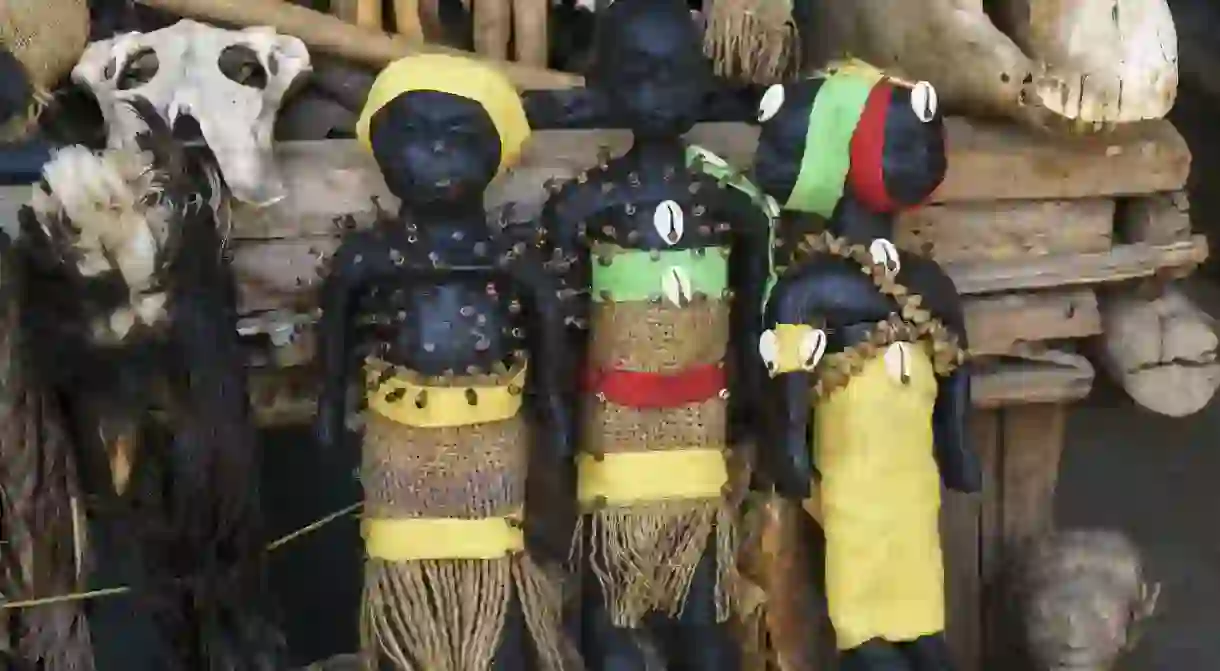A Look At Today's Voodoo Spirituality In Ghana

In a continent rife with ever-growing populations of Christians and Muslims, practicing traditional religions remains a quietly practiced but rarely discussed part of many Ghanaians’ lives. One such religion, Vodun, links Ghana to the wider African diaspora and still hold on to some of the same traditions and practices used generations ago.
Ghana—and Africa as a whole—is heavily associated with Christianity in various forms. From the traditional movements such as Methodist or Episcopalian to the more popular evangelical mega churches led by pastors without affiliations to or roots in traditional theology or divinity. All of these are products of colonial expansion and it is sometimes difficult to find and know what is still present that connects Ghanaians to their roots. Voodoo spirituality, known in Ghana as Vodun, is one of them.
Vodun is a traditional religion that connects not only West Africans in Togo, Nigeria, Benin, and Ghana, but is spread throughout the diaspora. It traces the journey of people of African descent throughout the world: in Ghana, the Ewe people call it Vodun; in Brazil, it is Vodum; in Haiti, Vodou; Cuba, Vodú; and in Louisiana, it goes by its most popular name: Voodoo. By some estimations, this polytheistic religion dates back thousands of years.

Contrary to popular belief concerning the word ‘voodoo’ in pop culture, the Ewe-rooted Vodun is not a vehicle for witchcraft and spells but a religion devoted to the cult of the ancestors. It aims for something more transcendent and unlike other religions, it does not build itself or centre itself around an origin story. Vodun believes that the answers to such large questions are beyond human comprehension. Instead, they worship and seek guidance from ‘the spirit of those who have come before us’. This is the literal translation of Vodun: it links the tribe through these spirits that can be traced back to the early years of human life.
Believing these divine essences control the earth, the living and the dead live side by side and are connected by nature through which the ancestors show themselves. As all living things are seen as divine, the Vodun believers utilise herbal remedies and medicines as well as talismans called fetishes which consist of dried animals, bones, human parts, and skulls that are sold for spiritual healing and rejuvenating properties and are the focal points of the markets.

Like many ancient religions around the world that are rooted in nature and that existed before the Judeo-Christian tradition rose, Vodun is a female-centric religion. It contains both a female priesthood and a Queen Mother who all play central roles and can be seen as protectors of the religion. The Queen Mother is usually the first daughter of a matriarchal lineage who leads rituals and ceremonies including baptisms, weddings, and funerals. She is a prominent and important member of the community and she oversees the running of the markets, leads prayer ceremonies and in the past, organised the other women of the tribe in their duties when the men would go off to war. The other role of the female priestess—Mawu/Mahu—is one chosen by the oracle and this calling can come at any time. After it does, the chosen one receives spiritual instruction concerning her role from the clan convent. It is a role that was previously limited to those of blood relation to the clan but in recent years, it has been opened up to the wider community.
There are an estimated one million people in Ghana who practice this particular traditional religion and about 13 percent of the population as a whole practice other traditional religions also rooted in ancestor cults. European expansion, colonialism, and the subsequent totalitarian regimes throughout the continent sought to suppress most of them with varying degrees of success. The notion of deities being born to clans and tribes that are heavily linked to social and political order in villages means that they remain unlikely to die out. Though Christianity (as well as Islam) have a strong hold on the continent, these practices still prevail and link practitioners through time and geography to a common ancestry great diaspora around the world.














